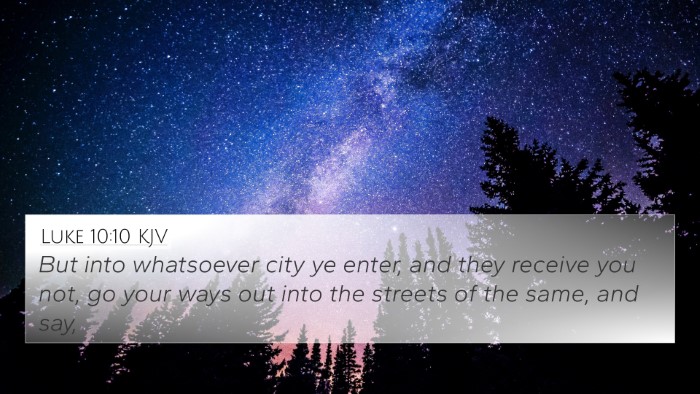Ezekiel 2:5 - A Comprehensive Analysis
Bible Verse: Ezekiel 2:5
Verse: "And they, whether they will hear, or whether they will forbear, for they are a rebellious house, yet shall know that there hath been a prophet among them."
Meaning and Interpretation
This verse serves as a pivotal point in understanding the prophetic ministry of Ezekiel. It emphasizes the attitude of the people towards God's message and the certainty of their recognition of the prophetic voice, regardless of their disobedience.
Key Insights from Commentaries
- Matthew Henry: This commentary highlights the essence of God's communication through His prophet. The people are described as "rebellious," indicating a persistent refusal to heed divine warnings. Henry emphasizes that the recognition of a prophet's presence is crucial, even if the people choose to ignore the message.
- Albert Barnes: Barnes elaborates on the impact of prophetic authority; he notes that the presence of a prophet among a people is significant not merely for warning but also for the opportunity of repentance. He insists that even a refusal to listen will lead to an understanding that the prophet was among them.
- Adam Clarke: Clarke focuses on the consequences of rejecting prophetic guidance. He notes that the acknowledgment of a prophet indicates that the truth was presented, thereby leaving the people without excuse for their rebellion. His commentary underscores the inevitability of accountability before God.
Cross-References for Ezekiel 2:5
This verse connects with several other scriptures that highlight themes of prophecy, rebellion, and the call to listen to God's messages. The following are notable cross-references:
- Ezekiel 3:7-9: Declares Israel's unwillingness to hear God's words.
- Jeremiah 7:27: God instructs Jeremiah to speak to the people, knowing they would not listen.
- Isaiah 6:9-10: A prophetic call expressing that people will hear but not understand.
- Matthew 13:14-15: Jesus references Isaiah, showing a fulfilled pattern of hardened hearts.
- Luke 10:16: Jesus speaks about receiving the sent ones (prophets) as receiving Him.
- Acts 7:51: Stephen accuses the people of resisting the Holy Spirit as their ancestors did.
- Hebrews 1:1-2: God speaks in various ways through prophets, but finally through His Son.
Thematic Connections
The themes in Ezekiel 2:5 resonate with various Biblical exhortations regarding prophecy and the consequences of disbelief. It reflects on the ideas of rejection and recognition and lays down the groundwork for understanding the importance of heeding prophetic guidance in both the Old and New Testament.
Tools for Bible Cross-Referencing
- Utilize a Bible concordance for finding related verses.
- Employ a Bible cross-reference guide to explore deeper thematic connections.
- Incorporate cross-reference Bible study methods for a comprehensive understanding.
- Refer to Bible reference resources for in-depth study materials.
- Practice Bible chain references to trace themes through scripture effectively.
How to Use Bible Cross-References
For those seeking to delve into the connections between biblical texts, understanding how to find cross-references is key. Observing themes, phrases, and situations can help illuminate the richly woven narrative of scripture.
Identifying Connections between Testaments
One of the most enlightening practices in scriptural study is identifying relationships between Old and New Testament writings. Ezekiel's message carries both a historical and prophetic weight, seen also in the life and teachings of Christ.
Engaging in Comparative Bible Verse Analysis
By engaging in a comparative study of Pauline epistles and the prophets, scholars can note how early church teachings echo the warnings and calls for repentance shared by Old Testament figures like Ezekiel.
Conclusion
In conclusion, Ezekiel 2:5 serves as a powerful reminder of the role of the prophet and the expectation for the audience to respond to God's message. The cross-references deepen the understanding of prophetic themes and the continuity of God’s word through scripture. The tools and methods for cross-referencing enhance one’s ability to engage with the text meaningfully.














